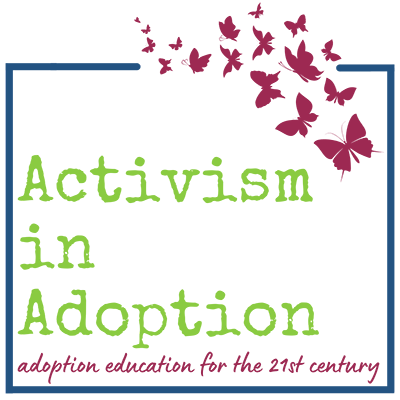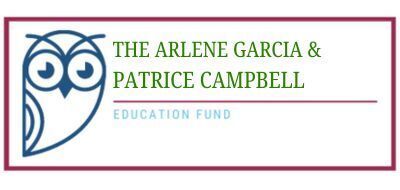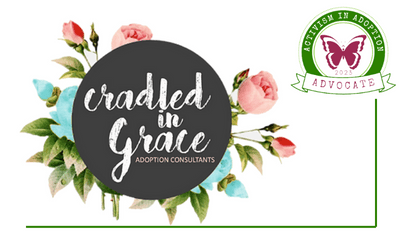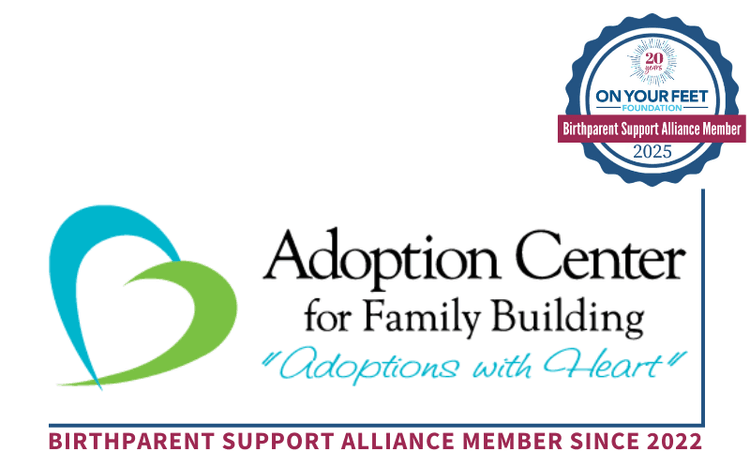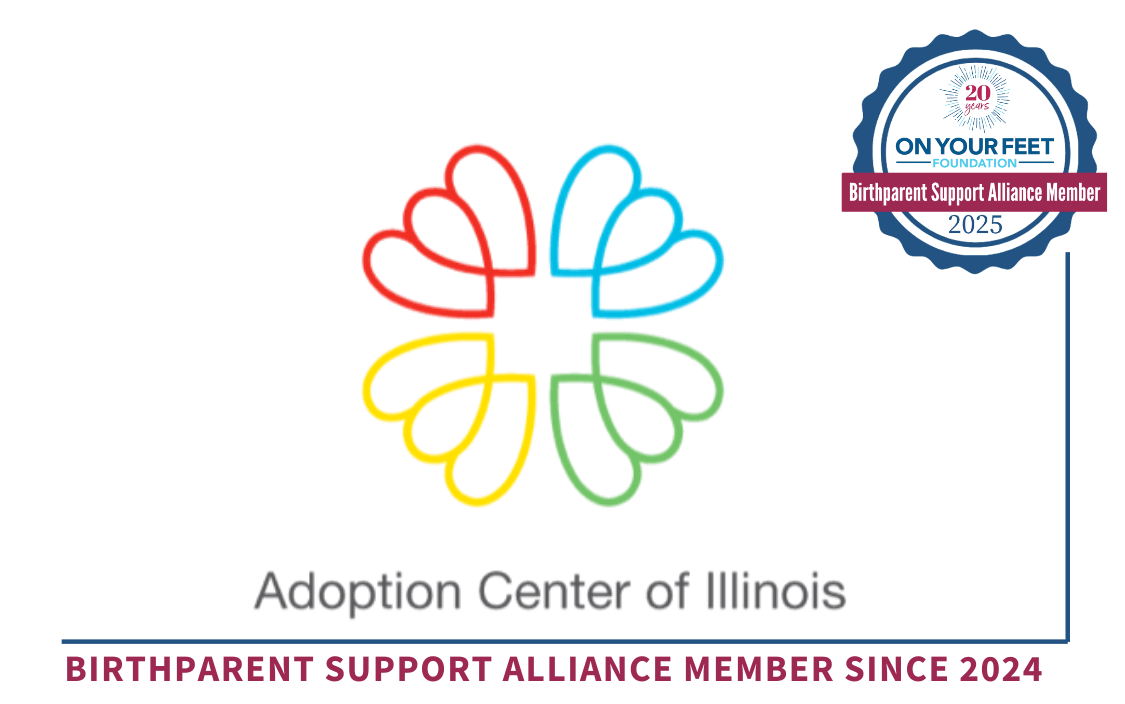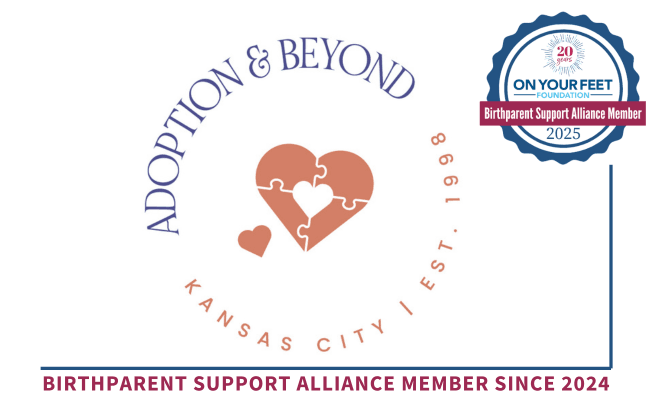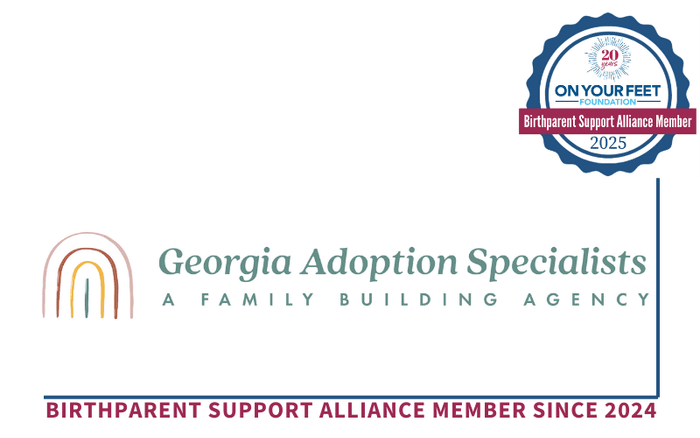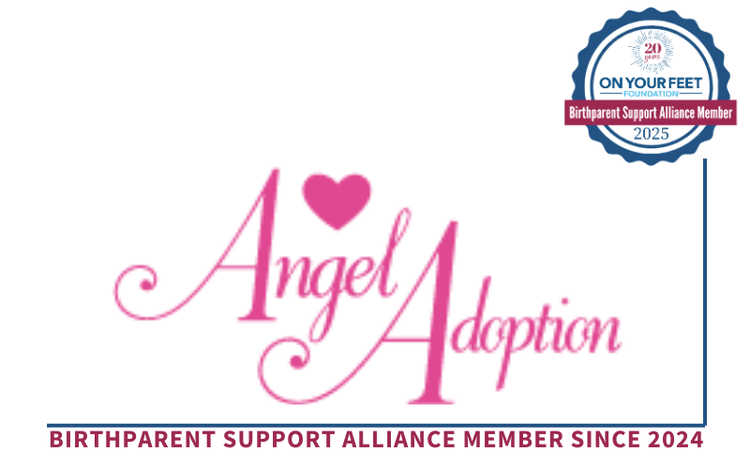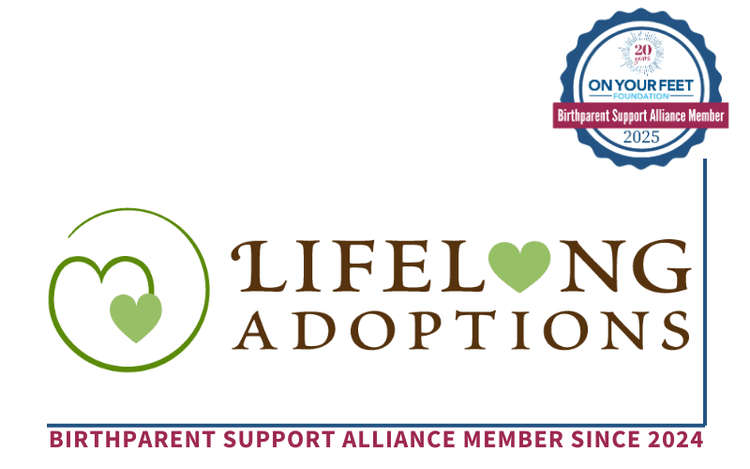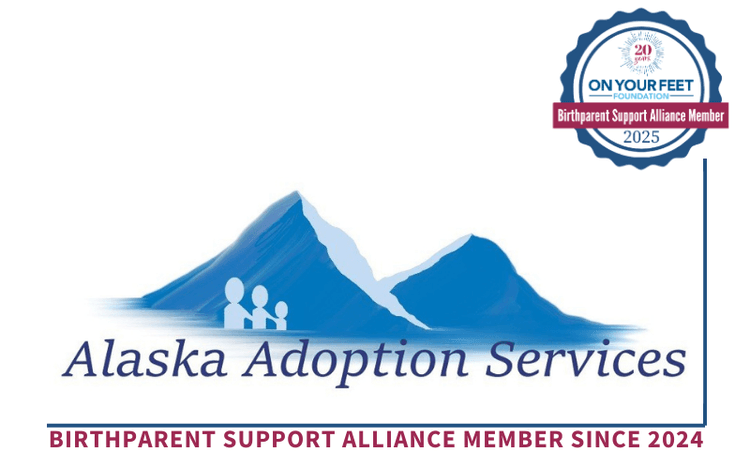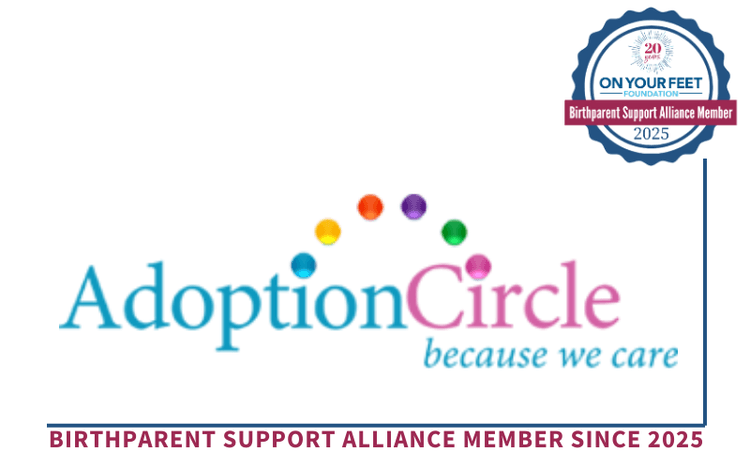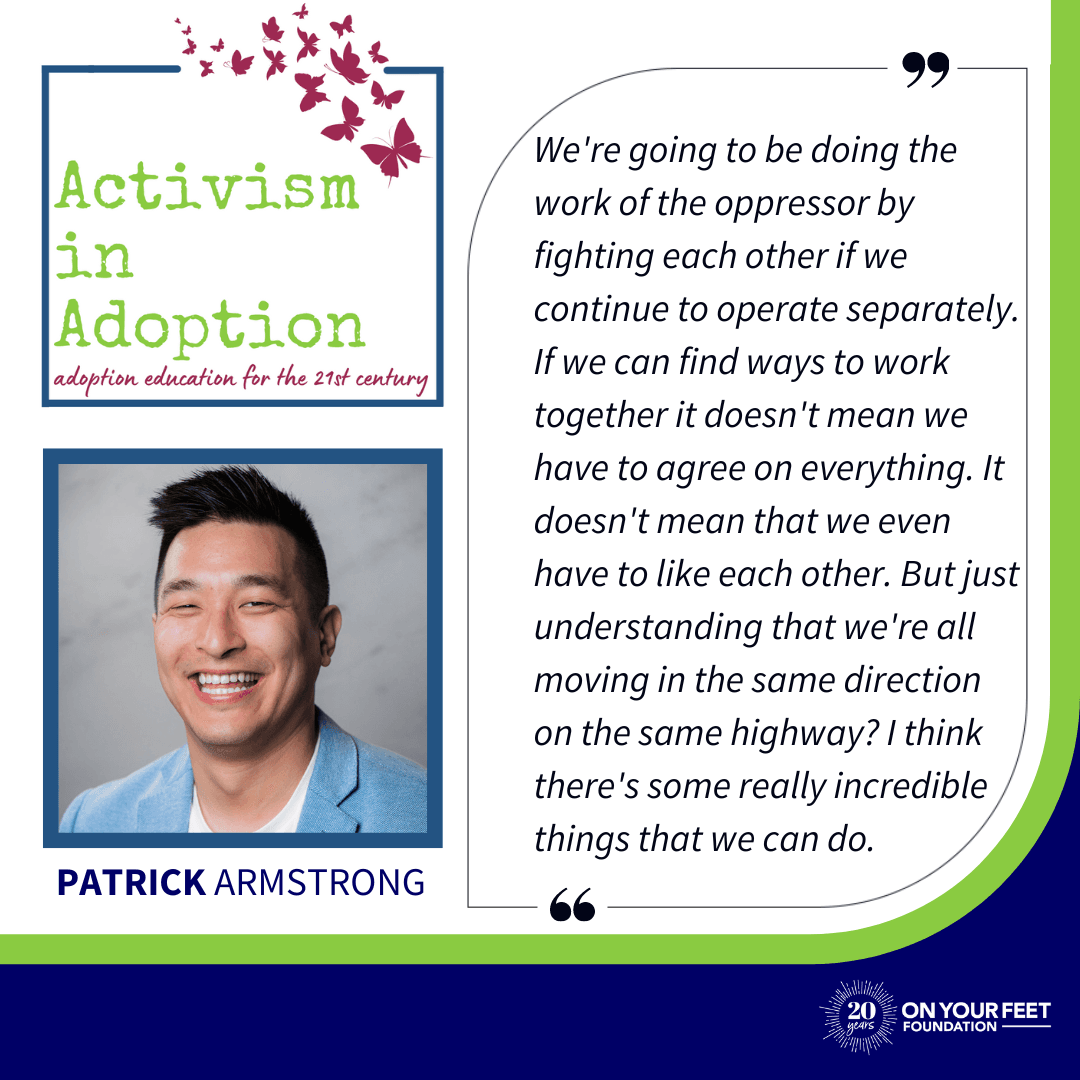
This week, Torie sits down with Patrick Armstrong, our upcoming Activism in Adoption speaker, to unpack the Adoptee Consciousness Model, what is was like to travel back to Korea as a Korean adoptee, and the importance of getting out of our individual adoption silos and working together in order to improve outcomes for adoptees.
It’s so great to see you and chat with you Patrick. Thanks for taking the time. Let’s start with you sharing your connection to adoption.
I am a trans-racial intercountry Asian American adoptee who was adopted from South Korea in 1990 and raised in a rural, predominantly white town in Indiana by a white family.
So obviously, your identity is very complex. Could you talk a little bit about what it was like being an Asian adoptee in that predominantly white context? And where do you find yourself today in your racial identity?
I do want to caveat that, two years after I was adopted, we adopted my younger sister who is not biologically related to me, but is also adopted from South Korea. So it wasn't like I was fully isolated, but when I think about my experience then, it did feel very much like isolation. I pretty quickly internalized my surroundings and rejected my Asian identity as a form of safety. But I didn't know it at that time. So for the longest time, I didn't think identity was so complex, I just wanted to be what everyone else looked like around me, that was the drive, that was the motivation and it was all wrapped up in being accepted into this community and this family. I did receive a lot of love and support, not just from my family, but from my friends as well, which was great. But I also couldn't ever articulate or talk about any of the things that I was feeling like, oh, I want to be white, or when something racist or aggressive were to happen to me, I just I laughed it off. I knew from hearing tangential conversations happening around me that race was something that we didn't talk about, and that my family probably had what would be considered conservative views on race and other people who are not white. So that was how I navigated life for a long time. Even when I went to college, I was so comfortable in whiteness and uncomfortable around Asian folks that I chose to just remain in the status quo, to quote the first stage of the Adoption Consciousness Model. But now I’ve fully gone through that model and have reached the place of being able to not only forgive myself, but forgive that younger version of me who was going through that experience. I’ve also been able to go through methods and modes of forgiveness with my adoptive family, and my birth family as well, even though I don't currently have any direct connection with them. I feel like through therapy over this last six months, I have found myself feeling and becoming more whole than I ever have been. So I went from rejecting my identity and that connection to culture and ethnicity and race for the first 30 years of my life to now being 33 going on 34 having made significant movement beyond that place of rejection.
You mentioned the Adoptee Consciousness Model - for those reading who may not be aware of what it is, can you explain it?
The Adoptee Consciousness Model is an adoptee-created framework for understanding how adoptees come to understand their individual place within this adoption-specific narrative, connect with community, and just gain a more comprehensive understanding of who they are. I think the most important thing outside of what it provides from a framework perspective is that it has been created by adoptees. There's language called coming out of the fog that a lot of people have used over the past 20 years, because it's feels like the standard for what we talk about when we talk about what I now call coming to consciousness. While that has been a great descriptor and metaphor for talking about this experience of starting to question and trying to think differently about your own experience and the larger narrative it comes to being adopted and an adoptee. However, that language was created by an adoptive parent. I think it's important for any community to be able to develop their own language. And I think we are seeing that happen now with things like the Adoptee Consciousness Model. So, long story short, the Adoptee Consciousness Model is an adoptee-created a framework for helping adoptees understand what it means to go through this experience, from a rejection standpoint to a standpoint of acceptance and self love.
That's a really good description. I realized when I asked you to define it that it may be hard to define on the spot.
It's interesting, because I've studied it a lot. But when I am defining it or talking about it, it is so rooted in my own experience, that I don't give even the general overview I just talked about; here's how I go through each of these stages. So when people ask me to give the elevator pitch, it’s like, well, it's how I understand myself.
Thinking about the model, do you feel like that process was linear? Do you think you will ever come back to certain stages?
That's a great question. I think, for me, it has been very linear, because I spent so much time in the status quo that I really didn't have anywhere else to go but move forward. One of the reasons I love the model is because it's built in a circular way, because at the end of the day, you can bounce between stages. And while I have not done that, yet, I have seen and heard and spoken with adoptees who have moved between the different stages, whether it be finding themselves back in dissonance, or having multiple rupture points, or spending a lot of time in expansiveness just reading and learning more. If I were to have been oscillating between two stages, it would definitely be the last two, which are expansiveness and forgiveness, and activism. I think, right in this very moment of recording this, I feel like I'm taking a step back into a sense of expansiveness so I can learn a little bit more about some other perspectives in this community. I think it's important to be able to recognize that it's okay to be able to do that. Another reason I love the model so much is because it isn't just a nebulous coming out of the fog and then that's it. It really lays out different stages that you can move between because it's not, and never can really be, a linear journey. Now that I'm talking about it, I have had multiple rupture points, but I would fall back into the status quo very quickly, because I wouldn't ask questions about what something meant, whether it be facing racism or a microaggression.
That reminds me a little bit of a recent post of yours, where you said, adoptees don't go looking to puncture holes in their own narrative, and that’s kind of representative of why we stay in the status quo. It’s very disconcerting to destabilize that identity core, one that we've been given largely because not a lot of it has been self-constructed. It can be terrifying to engage the ruptures.
And ruptures can lead to a bunch of different things. It’s a common theme that we all deal with abandonment and attachment. And at the end of the day, whether you have a positive or negative experience, anybody who's been adopted doesn't want to go through the process of losing a family again; they don't want to experience that loss. That’s why foster care is so difficult I think. There’s so many different types of problems that permeate that system. From my perspective, foster care perpetuates loss and centers that as opposed to asking how do we understand the root of why these losses continue to happen and understand what that does to a person who has to continually experience something like that?
So remind me, you took a trip to Korea in the last year or two? Is that correct?
I did. I took two trips, actually.
Can you discuss that? What was the catalyst for the trips and what was that experience like?
Yeah, so my first trip back was in October of 2022. I was selected as part of a program called Overseas Koreans Foundation, a government organization that promotes cultural understanding and returning to the Motherland for anybody who lives outside of the country or who's permanently based outside. It was a really profound experience to go back in that way because my wife was able to come with me. They provide airfare and a hotel to stay at while you're there for this week long conference, essentially. It's hard to describe. If you have followed me at all in the last year, you know that I've had some not-so-great things to say about it. But that goes back to how we center adoptees and the programs that we create for them. But it was really nice to go back. It was just too short for me. We did a lot and it was very fast paced. When we got on the plane to come home, my wife actually looked over at me and said, well, you ready to go home? And I instantly was like, no. And so I knew I had to come back.
I went back again in July of last year for the IKKA conference. So every three years, an organization called the International Korean Adoptee Association has a large gathering in Korea that’s a big multi-day conference. I went back for two weeks at that point but my wife was unable to come with me because we had just found out that we were pregnant. But that one was also very interesting in a different way. I felt like I had the time to do the things that I wanted to do; to just exist in Korea, in a place where everybody looks like me and I'm part of that majority in a way that I've never been before. I can just walk around, do whatever I want. There was no specific set agenda. That was really great. And I feel like I tried to maximize my time as much as I could. The conference was also really great. But during the conference week, I experienced a lot of emotional distress for a variety of reasons and coming back after that trip, I was ready to come home. But I was having an alternate reality where I could see myself living in Korea. It was very strange, because I still wanted to be home. I was ready to come home.
And through all of the emotional breakthroughs, I am calling them, that happened there, I realized when I got back that I needed to go to therapy. I needed to talk to somebody professional about this. And that was the beginning of my therapy journey. I don't want to say that it was traumatic. I think everybody if they have the opportunity should go back to their country of origin and experience it however they want to experience it and not in a set-in-stone type of way. Everyone should make it what they want. But just for me personally, things happened and things were happening outside of that, that just pushed me in a direction that I was like, okay, I really need to work on myself, I think, a little bit more. That's what Korea in July opened up for me; this idea that I have not gone as far as I thought I had, and that I wanted to go further, I needed to understand some things that this had brought up in me. And so that's why again, in the last six months, I've reached this place of wholeness, because I've been able to work through that and deal with that and seek professional help to get me to that point.
What kind of advice would you give on how to be there for an adoptee that is going through one of those large moments, whether it's a return to birth country, or reuniting physically with biological family? What can they do to support that process?
I think it all starts in the same place, I think: you have to listen and be willing to listen. And then out of that, I think, regardless of your own feelings in this - and not that your feelings are invalid - because this is such a large thing, and because the adoptee is working through this in a way like they're trying to figure out language or articulate in such a way and it's very confusing and also emotionally distressful. Not only are you listening, but you're willing to validate the feelings and emotions and things that they're expressing at this time as well. Even if you may not agree, even if it makes you feel a type of way, you have to be willing to validate in those moments and then together, you can work and walk through those things as a supporter. Because this particular journey is theirs, and it's not yours. And that means de-centering yourself from that moment, to allow them to feel and express what they need to express to validate those expressions of whatever it might be, and then work together in almost a collaborative way. moving forward. Because at the end of the day, you probably don't have the answer. They probably don't have the answer either. And it's like we have to work together to figure out what that answer could be and the answer could change.
I love that - it could definitely change. Yeah, I love that. The last phase of the consciousness model you mentioned is healing, forgiveness and activism. And you kind of mentioned that you you feel as though that is a place of wholeness that you've come to in recent months. What does that look like for you?
Yeah, great question. So I talked about Korea and coming back on the second trip, and realizing I had more work to do. I had been parenting these ideas of self-acceptance, and giving grace to my younger self, and Korea made me realize, I don't know if I was actually doing that, I think I was just saying it. And so the idea of being actually able to forgive anything that you might have felt or experienced, or even done, pre-consciousness in the status quo, or whatever, however, you are experiencing something. That's what has led me to becoming more whole. Since coming into this community, I've been very activated to do advocacy work, whatever it might be. But really, from an internal perspective, it has been looking at the different phases and stages of my life, and not just saying, oh, I can understand why young Patrick was going through that, but actually being able to look at him from across the table and be like, you know, I really do forgive you for that. And I can resonate and feel you in whatever it is that you're feeling in that moment. And if that's a big difference from even just accepting yourself. I would confuse self acceptance for self love. And I, through therapy, learn how to love myself and that younger version of myself, as opposed to just accepting them. I think they're two different things. And being able to do both is really great. And I think it's a big privilege, because I don't think that everybody gets to that point all the time. And sometimes it's easy to mistake, acceptance for love. And if you can figure out how to name both of those things, and move to both of those things, I think, for me, personally, that's where the wholeness comes in.
That's really powerful. You know, it just immediately makes me think of how a lot of adoptees of color experience acceptance in their families. And that families will often say, well, we accept you, as you are. But that's very different from being loved as you are. I don't want you to just see that I am a racialized person and have racialized experiences and acknowledge them. I want you to love me through them. So I think that's such an amazing concept for both individual self and for community.
100%. I have actually not thought about it that way, from an external perspective, like, it's been so internal for me to just get there for myself, but you're absolutely right. Like, it is one thing to just accept somebody. And that's great. Like, that's a great starting place. But it's an entirely different thing to truly love them in that way.
I had not really thought through the self acceptance versus self love. And that's really, really powerful. So, obviously, you're busy all the time. You have lots of projects that you're juggling, can you share a few things that you do, as part of that kind of wholeness and acceptance mentality? What work have you been up to?
The two things that I'm involved in weekly are podcasts. The first one is the Janchi Show, which was started in September of 2020 with two other Korean adoptees, K J Roelke and Nathan Nowalk. We're based in three different states and three different time zones. But we come back weekly to talk about the Korean adoptee and more broadly Asian adoptee experience, whether it's just with ourselves or with a guest. That has taught me a lot about the privilege of storytelling and being able to amplify and hear and learn from other people's voices and experiences. And then the other show that I do, which is a little bit newer is called conversation piece, it is about the missing pieces of the conversations that we're already having. So while the audience and whatever and whoever I'm talking to or about is very broad, when we get into the meat of the conversation, it's like, how do we get below the surface layer. And so by getting below the surface layer, we can talk about things like the difference between acceptance and love, the difference between a brave space and a safe space, things like that. So I keep saying differences, but it's not always differences. It's just like, you know, just digging a little bit deeper than like, again, coming out of the fog, like come trying to figure out and define things at a slightly deeper level. And then, I'm also developing another podcast.
I was accepted to a residency program with IUPUI for April, and I was already going to do this anyways. But then I happen to get lucky for this opportunity to come across my desk. It's for their speculative play and just futurities program, which is like a social focus program. And I've been really passionate about connecting and uncovering and building up the Asian diasporic communities here in Indianapolis. So I'm developing a four episode miniseries narrative podcast that tells the stories, and acts as a stepping stone to build a more deeper understanding of that community here in Indianapolis. And that's part of that wholeness is I didn't have Asian community growing up. And for the 10 or so years prior to 2020 that I spent in Indianapolis, I never made those connections. I never found myself building community with other Asian folks while I was here. And now that I'm back here, that's what I really want to do. And especially as a person getting ready to welcome their first child into the world who's going to be mixed race, Asian and white. I want to be able to leave them or provide them with a community that I never had and know that when they are 18, and they're ready to go do their own thing that they don't have to run away to find community culture and connection. They have it here, go explore, go do your thing. I'll always support you in that. And you know, you can come back here and we're going to celebrate whatever it is that we need to celebrate.
Wow. Well, congrats. That's really exciting. Going backwards a little bit, your podcast is about the missing pieces of the conversations we're already having, what would you say are a few of the gaping holes in the adoption conversations that are happening kind of at a larger scale? What's missing from that conversation?
Great question. So for context, I came to consciousness like a lot of people did during the pandemic, because we were all inside, so that was how we were building community. It was when a lot of people started telling their story for the first time. Something that I learned on this journey is that there's been people doing this for a really long time: people like Astrid Castro with Adoption Mosaic, and JaeRan Kim. What I've noticed is that a lot of people who are part of this wave of adoptees who have come to consciousness in the last three years, either don't know about this history, or act like we're the first people start doing this. And while it's great that we are doing it, I think we do ourselves and our communities a whole disservice when we don't recognize the folks that have come before us the history that we are built upon. I think that's really important for us to recognize because it helps for us to build upon what's come before and not build anew. We don't need to build anew. We can tell new stories, but we don't need to build new places and things to do that; we can be a part of this community that's already existed.
Something else I've been talking about is how Korean adoptees are statistically the largest inter-country group of adoptees so far, a little over 200,000. I recently came across a study that was talking about adopted people in the US and in the 2000 census, it was the first time that they ever asked about adoptive people in the household. So 2000 was the first time the government ever collected statistics on adopted people in the American household, and the number of adoptees was five million. So the 100,000 Korean adoptees who are here in the United States, if they've aged out of the household,are not included. And when you are the head of household, you're not marking that you're adopted on that census, I don't believe. So those numbers are probably not even accurate. But that was in 2000.
And the thing - the other gaping hole that I would like and try to address - is this idea that we can only do the work that we do in our own silos. There is this idea that I can only advocate for Korean adoptees or Asian adoptees, and that that's the only understanding that I should have. I think we again do ourselves a disservice by not understanding the enormity of this community that we are all a part of. If we think about how the international adoption system formed, it formed on the back of indigenous genocide and forced separation of families; it formed on the back of enslavement of Black people and Africans, and then the forced separation of those families, and the removal of those children. Our history doesn't start in 1950. It doesn't start in 1776, even, it begins well before that, and we are all connected through the struggle. And you can see, when a big natural disaster happens, or a war breaks out across the globe, one of the first things that happens is most likely white people, not always, but the majority of white people come out and say, how do I adopt one of these kids? And that only not only increases the number but makes it a global system. I think something that we don't think about very often is just how many people are actually adoptees - and that doesn't even include people who go through the foster care system - and how there's so much more we could do if we operated from the mindset of wholeness of the community, as opposed to thinking oh, well, because I'm a Korean adoptee then I should stay over here in my lane. We all have our own lanes. But all of those lanes are on the same highway, and we are all moving towards the same goal: better outcomes for our community. And our community includes all five million of those people on that census. Everybody who's affected by this by this the system, this experience, you know, it's all of us. And if we can start to move in that direction, you know, we can do a lot of the things that we are struggling to achieve at the moment.
That's fantastic. I love that. And it very much resonates with my own research and kind of the crux of my dissertation that this contemporary modern experience of transracial adoption is deeply linked to our historical notions of race and kinship and identity and national belonging. But like you're saying, the core is family separation and using that as a tool of oppression and subjugation is not new. No, that's really the foundation of our country. Exactly.
Exactly. It's part of the bedrock. And that is why again, I think the two things that I bring up are linked because it all goes back to the this understanding of history and where we come from. A lot of people don't identify as an adoptee, but I truly believe adoptee has become an identity that people hold, because it affects you every day. We have been told and made to feel like that part of our identity is less than the other parts - like you're Black, or you're disabled, or your gender or whatever, you know, your ethnicity - like it is on equal footing, because there is a whole community in this whole history that we can understand. And we want to do the same thing when it comes to our other communities and identities that we come from. We have to understand those histories, to understand and contextualize our own individual place in the larger fabric. And by understanding that it actually allows us to work better across communities, and work and build coalitions and solidarity across those things, those invisible lines, because, again, like you said, it's all rooted in the same struggle.Adoption, specifically,is rooted in family separation. And that's a tactic that's been happening for a long time, even before it had a name.
Exactly. I love that that's beautifully put, and you're so right, the struggle that we have, you know, whether it's anti-Blackness, whether it's, anti-Asian sentiment, whether it's the family policing, system, incarceration, indigenous sovereignty, I mean, they are so, so linked, and, you know, that just reveals what we all already know, is that our struggle is not individual, like you're saying it's not siloed. Our freedom is caught up in everybody else's freedom. And I think that's one reason I love the adoptee identity so much is because it's a new way to understand that piece of knowledge. That my freedom has to be your freedom.
Exactly.It's a wide highway, and there's a lot of lanes for us to operate in, and we need everybody operating in those lanes. All of these experiences are valid, whether you are on one end of the spectrum of I really hate adoption, and I am abolitionist or you're on the opposite side say, I love adoption, I think that it really helped me and other people and, and I'm all for it and support it. At the end of the day, we need both of those ends, and then everything that falls in between - everybody that falls in that gray space; who's just trying to figure it out - because both of those groups and then everyone in the middle again, I truly believe have the same goal for our community, which is better outcomes. And we can get there together, or we can try get there individually, but if we go that route it's going to take a lot longer, and we're going to be fighting each other. We're going to be doing the work of the oppressor by fighting each other if we continue to operate separately. If we can find ways to work together it doesn't mean we have to agree on everything. It doesn't mean that we even have to like each other. But just understanding that we're all moving in the same direction on the same highway? I think there's some really incredible things that we can do.
To learn more about Patrick, visit his website, or find him on Instagram or TikTok, or listen to his podcasts, The Janchi Show and Conversation Piece. To hear Patrick speak, visit Activism in Adoption , where he is giving a talk focused on the Adoptee Consciousness Model, a way of understanding adoption designed by adoptee scholars, which describes how adoptees become aware of the larger social issues (racism, poverty, unethical agency practices etc).
